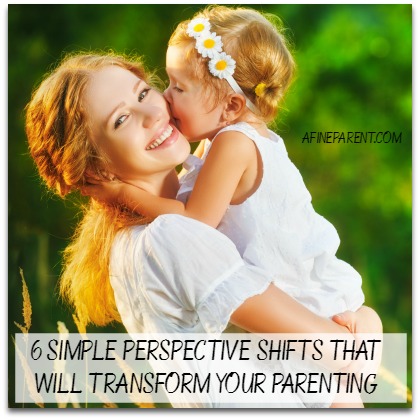 Here’s a parenting conundrum for you…
Here’s a parenting conundrum for you…
Sometimes you chug along… Everything flows smoothly. You are on top of your game. Every time you see your friends struggling with this particular aspect of parenting, you wonder: Why? What is the big deal?
And then there are other times when you just can’t seem to get something right. It doesn’t matter how hard you try or how many new “techniques” you test… some issues that bothered you when your kids were 3, are still issues when they are 13. And you’re just stuck and spinning your wheels.
Case in point: I have a tween. Some days we get along great. He wants to spend time with me. We have deep conversations about what is going on in his life. I’m rejoicing that we have such a close and loving relationship. And then I’m suddenly on a tilt-a-whirl! Suddenly he’s mad and shouting and then I’m shouting and then WHAM! He’s stomped up to his room and slammed the door. It doesn’t matter how many times we go through this, it’s always the same and I just can’t figure out why.
What gives? Why is it that we are so good at a few things, and we suck at others?
Turns out there is a simple explanation – perspective.
I was putting together the summaries for the talks at the FREE online Positive Parenting Conference that Sumitha was working on, and every now and then the speaker would say something that made me go “Aha!”
These are fundamental shifts that knock down some long-held belief or value. Or makes you see things in a completely different light. It’s these that make the difference between whether we ace an aspect of parenting, or struggle with it endlessly.
I’ve put together a few of these perspective shifts for you to consider. Take a look. Who knows… maybe one of these will transform one of your “I don’t know what to do” items into a “I’ve totally got this” item!
Alright, here we go –
#1 Emotional Intelligence
This first one is from the talk How to be an Emotionally Intelligent Parent with Dr. Laura Markham.
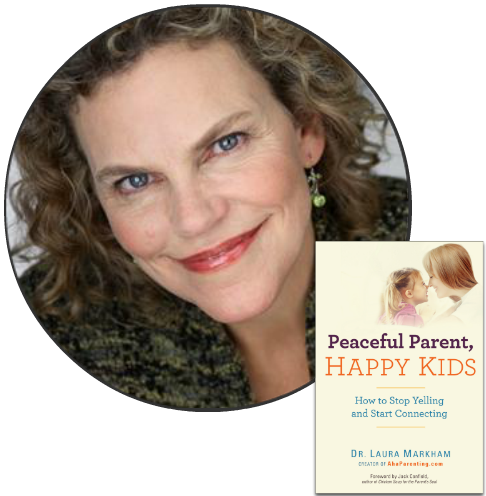 Dr. Laura is a clinical psychologist based in Brooklyn, NY whose site, AhaParenting.com has become a bastion of information and guidance for those of us struggling with parenting. Dr. Laura’s relationship-based parenting model has helped hundreds of thousands of parents and their children. One of the main ideas at the core of her model is Emotional Intelligence, or how smart we are about our emotions. This concept is expressed throughout her book Peaceful Parent, Happy Kids: How to Stop Yelling and Start Connecting. Besides her work bringing peace to households everywhere, she is also a blissful mom of two adult children.
Dr. Laura is a clinical psychologist based in Brooklyn, NY whose site, AhaParenting.com has become a bastion of information and guidance for those of us struggling with parenting. Dr. Laura’s relationship-based parenting model has helped hundreds of thousands of parents and their children. One of the main ideas at the core of her model is Emotional Intelligence, or how smart we are about our emotions. This concept is expressed throughout her book Peaceful Parent, Happy Kids: How to Stop Yelling and Start Connecting. Besides her work bringing peace to households everywhere, she is also a blissful mom of two adult children.
How important is Emotional Intelligence? Read Dr. Laura’s perspective shifting answer:
“Research shows that the more we believe that we can grow and change emotionally, the better we become at coping with our own emotions and the emotions of others. … What researchers think is that it’s Emotional Intelligence that most trips us up and sabotages us. You might get a job because you’re smart, but you won’t keep that job unless you can get your work done on time and not procrastinate; or if you can get along with your co-workers; if you can get along with a customers or your boss; so you can stay in a good mood and tackle the problem even though you had a defeat. You know? Resilience. Self-Discipline. All of these things are Emotional Intelligence at work. We can’t be successful without them.”
She goes on to explain how this is true in parenting as well… Because parenting isn’t just about a bunch of tricks and techniques. It’s about how well we handle whatever is thrown at us.
Can you imagine how powerful being an emotionally intelligent parent can be? Can you imagine how much simpler life will be if we can handle whatever our kids throw at us with calm balance, instead of a murky emotional soup of anger, frustration and exasperation?
#2 Motherhood
This next one is from a talk with Suzi Lula titled How to Leave “Mom Guilt” Behind Once and For All.
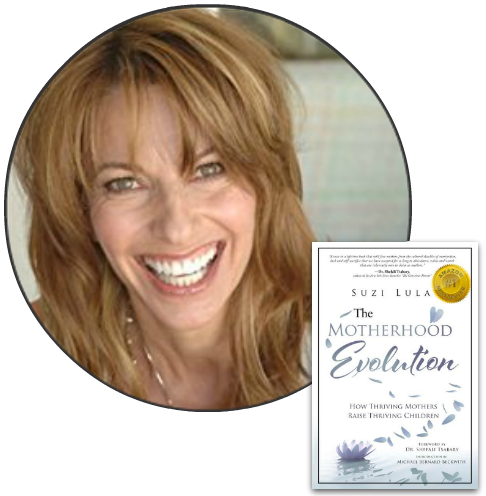 Suzi has 20 years of experience working with mothers as a counselor and a spiritual advisor. She uses her Masters’ Degree in Spiritual Psychology to reach those in need via her website, www.SuziLula.com, and to consistently challenge the idea that Motherhood = Martyrdom. Her book, The Motherhood Evolution: How Thriving Mothers Raise Thriving Children examines motherhood and what it means to be a “good mother.” When she is not being a mom and advisor to those in need, she finds her own fulfillment in music. She is a composer and an award-winning pianist!
Suzi has 20 years of experience working with mothers as a counselor and a spiritual advisor. She uses her Masters’ Degree in Spiritual Psychology to reach those in need via her website, www.SuziLula.com, and to consistently challenge the idea that Motherhood = Martyrdom. Her book, The Motherhood Evolution: How Thriving Mothers Raise Thriving Children examines motherhood and what it means to be a “good mother.” When she is not being a mom and advisor to those in need, she finds her own fulfillment in music. She is a composer and an award-winning pianist!
Here’s a huge perspective shift for us moms from Suzi about mom guilt:
“Have you ever met a mom that doesn’t want to be a good mom? We all want to be good moms and then with that comes this unconscious avalanche of what that means to be a good mom. …You know, our intentions are good. We have good intentions to be a good mom. And I believe that Motherhood invites us to reevaluate and to maybe for the first time ask ourselves ‘well, what in the world does being a good mom mean for me?’ I encourage mothers to really deconstruct this idea of what it is to be a good mother and, first and foremost, invite the possibility that being a fulfilled mother will then paradoxically make you a good mother.”
Isn’t that the truth? Haven’t you ever gotten so caught up in being a good mom that at the end of the day, all you were left with was a feeling of having failed spectacularly, and feeling completely wretched and guilty? What if we could all step away from wanting to be “good” moms and focused on being “fulfilled” moms instead? What a powerful antidote it could be for mom guilt!
#3 Yelling
This particular perspective shift comes from the talk 3 Crucial Perspective Shifts that will Help You Stop Yelling at Kids with Sheila McCraith.
And boy! As a reforming yeller this one really spoke to me!
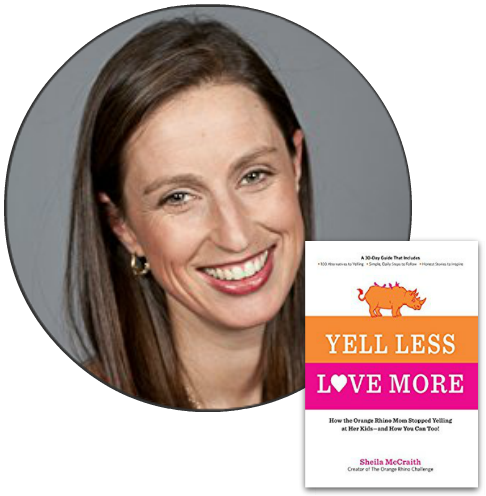 Sheila McCraith took what could have been a mortifying screaming episode with her 4 boys and turned it on its ear. While moms like me would have drowned those memories in a pitcher of margaritas, she took it, owned it, and built www.TheOrangeRhino.com. She now crusades to help other stressed-out parents yell less and love more. Her website, Facebook page, and book Yell Less, Love More: How The Orange Rhino Mom Stopped Yelling at Her Kids–and How You Can Too! are go-to resources for support, understanding, and guidance for all of us on the path to yelling less.
Sheila McCraith took what could have been a mortifying screaming episode with her 4 boys and turned it on its ear. While moms like me would have drowned those memories in a pitcher of margaritas, she took it, owned it, and built www.TheOrangeRhino.com. She now crusades to help other stressed-out parents yell less and love more. Her website, Facebook page, and book Yell Less, Love More: How The Orange Rhino Mom Stopped Yelling at Her Kids–and How You Can Too! are go-to resources for support, understanding, and guidance for all of us on the path to yelling less.
Here are a few perspective-shifting words of wisdom from Sheila:
“When you feel cruddy about yourself and whatever you feel on the inside is what you put out… That’s really what it’s about is yelling less and loving more so that when we look back and our kids remember us it’s ‘Mom didn’t yell all the time.’ They remember the positive.”
Sheila goes on to talk about an epiphany of how she noticed she yelled more at her kids when her jeans didn’t fit well, and I couldn’t help but think that’s probably true for many of us moms out there! I used to think yelling was all about patience (or lack thereof), but there is so much more to it and a lot of it can be managed with some simple creativity.
#4 Rules and Renegades
This one is from the talk What to do When Your Child Does NOT Want to do the “Right” Thing with Heather Shumaker.
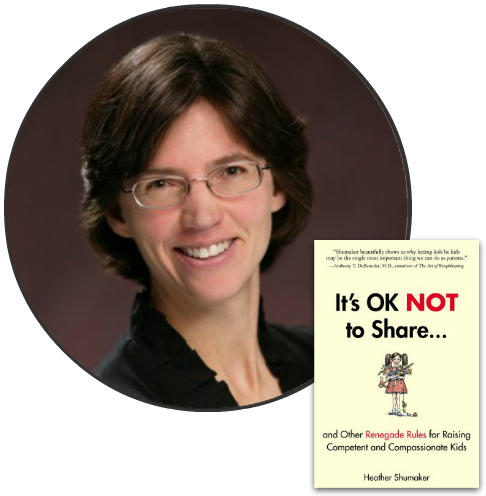 Inspired by an unorthodox preschool in Ohio where they allowed children to do things that would make most parents today faint, Heather Shumaker has called her parenting philosophy “Renegade Parenting.” She has published her views on her website, www.HeatherShumaker.com, and in her books It’s OK NOT to Share … and Other Renegade Rules for Raising Competent and Compassionate Kids and It’s OK to go UP the slide … Renegade Rules for Raising Confident and Creative Kids. She is on a mission to reshape how we see our children in their different stages of development. She is also inspired by nature and loves spending time encouraging her Renegade Children to fully explore the grand outdoors.
Inspired by an unorthodox preschool in Ohio where they allowed children to do things that would make most parents today faint, Heather Shumaker has called her parenting philosophy “Renegade Parenting.” She has published her views on her website, www.HeatherShumaker.com, and in her books It’s OK NOT to Share … and Other Renegade Rules for Raising Competent and Compassionate Kids and It’s OK to go UP the slide … Renegade Rules for Raising Confident and Creative Kids. She is on a mission to reshape how we see our children in their different stages of development. She is also inspired by nature and loves spending time encouraging her Renegade Children to fully explore the grand outdoors.
Read some of Heather’s renegade philosophies on sharing:
“Often, say in the case of sharing, we are trying to achieve generosity, awareness of others, kindness. Right? These are good, good social values, but the way we try to go about it, we push, ‘You’ve got to share.’ … we try to push this sharing until it becomes an enforced sharing. That doesn’t feel good, when you get something taken away from you. So, from the child’s perspective sharing becomes something that feels terrible.”
“Think about the life skills they’re learning in this circumstance [of not being forced to share]. They’re learning to set boundaries and stand up for their own rights and speak directly to the other child, not run for an adult. And then the waiting child is learning how to cope with big, difficult, negative emotions. Which are huge life skills!”
Can you imagine how freeing it will be for both you and your kids when you can inspect some of the rules that are constantly causing frustration and drop those elements that are causing constant friction? We are not talking about no laws here… rather, about learning to focus on the intent of the law, rather than blindly following the letter of the law. Very powerful stuff!
#5 “Sensible” Parenting
This one is from Roma Khetarpal’s talk 5 Easy-to-Remember Non-Verbal Communication Skills that will Make You a More Mindful Parent.
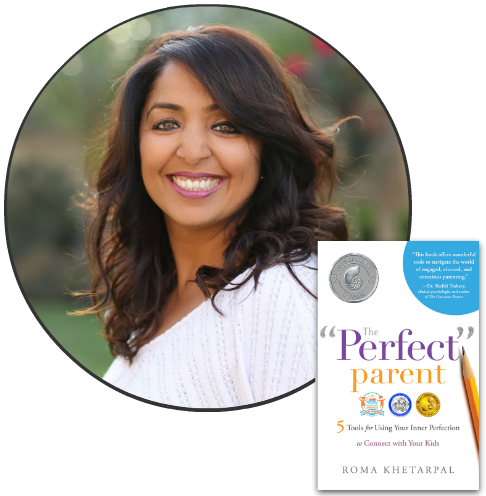 Roma’s mission in life as a parentologist is to change how we communicate with our kids. She is doing this through her book, The “Perfect” Parent: 5 Tools for Using Your Inner Perfection to Connect with Your Kids and as one-half of the powerhouse team that developed Tools of Growth. One of her findings is that communicating with our kids using all 5 senses is really the key when it comes to parenting.
Roma’s mission in life as a parentologist is to change how we communicate with our kids. She is doing this through her book, The “Perfect” Parent: 5 Tools for Using Your Inner Perfection to Connect with Your Kids and as one-half of the powerhouse team that developed Tools of Growth. One of her findings is that communicating with our kids using all 5 senses is really the key when it comes to parenting.
Read this perspective shifting idea on using our senses in communication from Roma:
“Using our senses is what creates a complete experience. And everything in parenting is about connection and that connection comes from a full experience. From a heart-felt experience. And when we synchronize our senses or when we use our senses with each other we’re really harnessing the fullness that we will receive from that experience. Which really leads into the connection. Which leads into the relationship. Which leads into having been bonded with our children.”
She goes on to explain how really seeing our kids, listening to them, using simple touches and engaging all our senses can make a relationship-based approach to parenting not just easy, but also extremely fulfilling.
#6 Emotional Meltdowns
This one is from the talk How to Respond to Tears to Raise Strong Kids with Kate Orson.
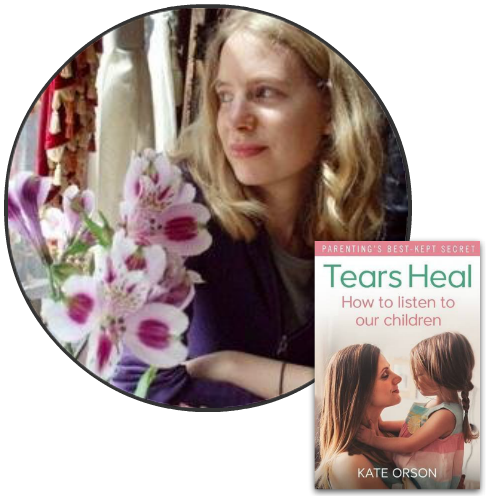 Kate is a passionate Hand In Hand Parenting coach. Through her website, www.KateOrson.com, she offers her coaching services to parents across Europe and in the UK. In her book Tears Heal: How to Listen to our Children, she challenges the cultural compulsion that stops children from crying and requests instead that we create safe spaces that encourage our children to express their emotions. She is practicing her craft as she and her husband raise their 5-year-old daughter in the Alpine environs of Switzerland.
Kate is a passionate Hand In Hand Parenting coach. Through her website, www.KateOrson.com, she offers her coaching services to parents across Europe and in the UK. In her book Tears Heal: How to Listen to our Children, she challenges the cultural compulsion that stops children from crying and requests instead that we create safe spaces that encourage our children to express their emotions. She is practicing her craft as she and her husband raise their 5-year-old daughter in the Alpine environs of Switzerland.
Here are some of Kate’s paradigm-shifting thoughts about the positive role tears have in our children’s lives:
“…Crying is actually beneficial to children. It’s like a natural stress reliever in the healing process.”
“It can seem like a toddler is very petty and irrational for crying about such a small thing as like a broken cookie or they wanted the blue cup, and they got the red cup, and they are upset. Often what it actually is, is that the language center of their brain is still developing. So often when they get upset, they can’t put their feelings into words. And usually there is a deeper reason for it underneath.”
Once you start thinking of tears and emotional meltdowns as just a natural stress reliever, you may actually find yourself thankful for that big cry, instead of getting worried/agitated/frustrated by it. Can you imagine that?
So, there you have it – the 6 perspective shifts that can transform your parenting from the Positive Parenting Conference. I can’t wait to share my insights from the “deep dive” talks… look for that in the next article.


I stumbled upon one of the talks of your parenting conference through a link on a Facebook group I am a part of and I feel I struck gold!! I was familiar with the work of some of your panelists through my own positive parenting journey but have discovered some new ones who are great. I especially liked the one that teaches not to use the phrase “good job” : that was a new concept to me and makes a lot of sense. Really enjoyed all the talks I have listened to so far. Kudos to you for putting such a great group together!
Learning that crying was restorative and that kids needed to be helped through it (not just shut down) has made a huge positive impact on the way I interact with kids. Rather than trying desperately to stop the crying, I can tune in to them, offer empathy, remind them that they’re safe, and truly reconnect with them after they’ve released the heavy emotions.
This was a HUGE perspective change for me as well, Amy. Initially when I started to hold my daughter through a Big Cry, her crying episodes actually increased and I was worried for a bit… eventually though she seems to have got rid of most of everything that she had stuffed down through the years, and we don’t have to deal with the “baggage” anymore. If things upset her now, she just lets those out through a few sniffles and we move on… It’s SUCH a relief to simplify the otherwise complicated maze of dealing with emotions!
Wow, 16 fantastic participants and not a single man. Not that I think a man should be artificially added if they are not the best participant, it’s just super unfortunate. It would be fantastic to have the dad experts engaged in these conversations as well.
I agree, Kelly. I would love to have some experts who are dads too. I reached out to a few but it didn’t quite pan out. If you have any suggestions, please do let me know. I will try to get them on the panel for the 2018 conference 🙂